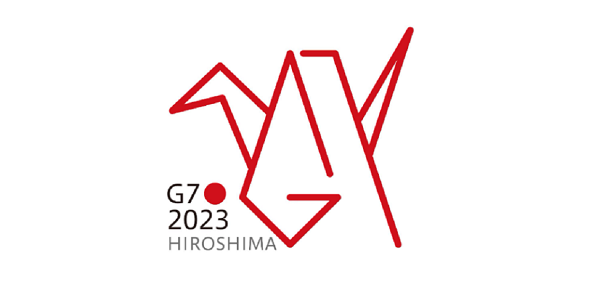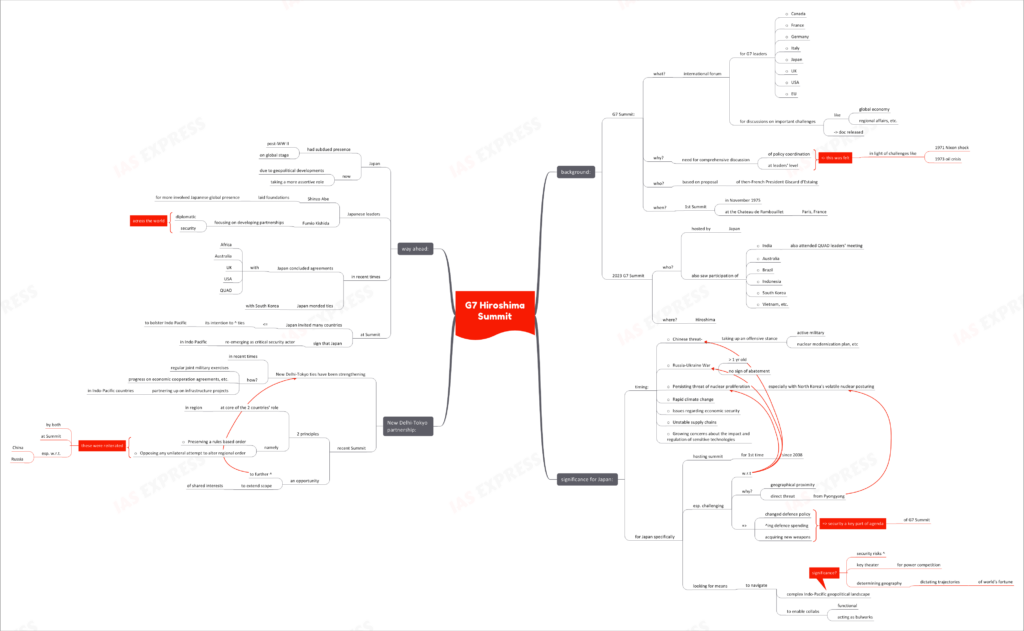G7 Hiroshima Summit- Implications for Japan’s Role

The G7 Summit in Hiroshima holds significance in light of the recent developments like the Russia-Ukraine War, Chinese aggressions and North Korean nuclear threat. It marks Japan’s re-emergence as a key geopolitical player, not only in the Indo-Pacific region, but also the larger global stage.

This topic of “G7 Hiroshima Summit- Implications for Japan’s Role” is important from the perspective of the UPSC IAS Examination, which falls under General Studies Portion.
Background:
- The G7 Summit is an annual international forum for the G7 member states-
- Canada
- France
- Germany
- Italy
- Japan
- UK
- USA
- EU
- At this Summit, the G7 leaders discuss important challenges faced by the international community- such as regional affairs, global economy, etc. and issue a document.
- This forum was established to address the need for comprehensive discussion of policy coordination, at the leaders’ level, following various challenges like the 1971 Nixon shock and the 1973 oil crisis.
- Based on the proposal of the then-French President Giscard d’Estaing, the 1st G7 Summit was held at the Chateau de Rambouillet, Paris, France, in November 1975.
- The 2023 edition of the Summit was held in Hiroshima, under Japanese presidency.
- Notably, the Indian PM attended the G7 Summit and in-person QUAD leaders’ meeting. Other participants included:
- Australia
- Brazil
- Indonesia
- South Korea
- Vietnam, etc.
Why is the Summit significant for Japan?
- The Summit’s timing is significant given the current challenges:
- Chinese threat- increasingly taking up an offensive stance with its active military, nuclear modernization plan, etc.
- Russia-Ukraine War- now more than a year old and without much indication of abating anytime soon
- Persisting threat of nuclear proliferation- especially with North Korea’s volatile nuclear posturing
- Rapid climate change
- Issues regarding economic security
- Unstable supply chains
- Growing concerns about the impact and regulation of sensitive technologies
- Tokyo is hosting the G7 Summit for the 1st time since 2008. While these challenges hold interest globally, they are of higher concern to Japan, given its geographical proximity to China, Russia and North Korea.
- Following the outbreak of the Russia-Ukraine War, Japan altered its defence policy, plans to increase defence spending and acquire new weapons systems.
- China is has become increasingly assertive with respect to its territorial claims in the East China Sea and the South China Sea.
- Pyongyang has even threatened to attack Japan with its nuclear weapons.
- Hence, security has informed a large part of the Summit’s agenda.
- For Japan, the Summit was significantly driven by its need to come up with means to navigate the complex Indo-Pacific geopolitical landscape to enable collaborations that not only are functional but also act as bulwarks.
- This is because the Indo-Pacific has become rife with security risks. It is not only a key theatre for power competition but also a determining geography that dictates the trajectory of the rest of the world’s fortunes.
On New Delhi-Tokyo partnership:
- In the recent times, the New Delhi-Tokyo ties have been strengthening- organization of regular joint military exercises, progress on economic cooperation agreements, etc. India and Japan have been partnering up on infrastructure projects in the Indo-Pacific countries.
- The recent G7 Summit presented an opportunity for the two countries to further strengthen their cooperation and expand the scope of their shared interests.
- 2 principles form the core of India’s and Japan’s role in the region:
- Preserving a rules based order
- Opposing any unilateral attempt to alter regional order
- Both these principles were reiterated at the recent Summit, especially in reference to Russia and China.
What is the way ahead?
- Though Japan maintained a subdued political presence on the global stage post-World War II, the geopolitical developments over the years have led to the Asian country taking up a more assertive role.
- Like the former Japanese PM Shinzo, his successor Fumio Kishida is also enthusiastically working to strengthen Japan’s role in the world. While Abe laid the foundations for a more involved Japanese global presence, Kishida has been focusing on developing security and diplomatic partnerships across the world.
- In the recent times, Japan has concluded agreements with Africa, Australia, UK, USA and the QUAD. One of the most notable developments is the improvement in ties with South Korea.
- Japan’s intention to strengthen its ties with allies to bolster the Indo-Pacific region can also be seen from Tokyo’s invitation of multiple countries’ heads to the recent Summit.
- The Summit is a sign that Japan is re-emerging as a critical security actor in the Indo-Pacific.
Conclusion:
Japan hosting the G7 Hiroshima Summit, amid the various developments like war in Ukraine, Chinese aggressions in the Indo-Pacific and nuclear threat from North Korea, is a reiteration of the east Asian country’s re-emergence as an assertive global actor. Both India and Japan stand to benefit from building on the existing ties.
Practice Question for Mains:
Comment on the significance of Japan hosting the G7 Summit. (250 words)

